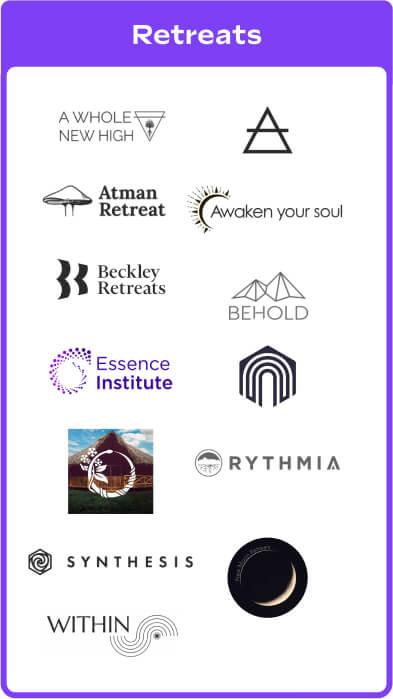PsychedelicScape 2023: Psychedelic Companies Building the Future
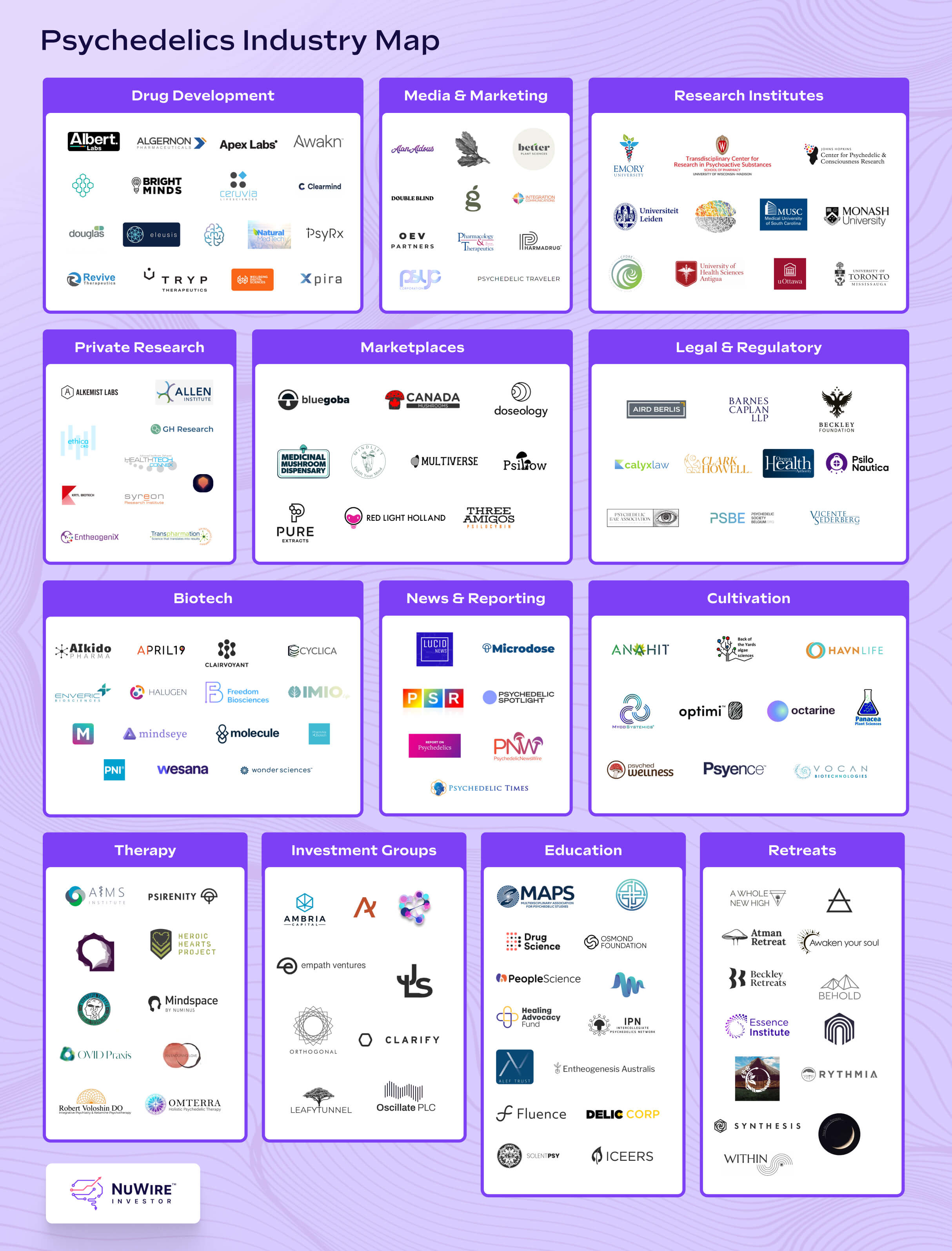
Drug Development
The drug development process is a multistep procedure that can take several years to complete. The process involves discovering chemical compounds, researching these compounds, integrating them into useful medication, trialing the medication, getting FDA approval and finally releasing a finished product to the public.
Psychedelic drug development companies do not carry out this process for only one compound at a time. At any given moment, development companies likely have several promising compounds at various stages of the development process. This method is used because there is a high failure rate during this process, so developing multiple drugs helps to mitigate risk and increase the likelihood of creating a successful product.
Some drug development companies may specialize in one step of the development process. For example, some companies focus on discovering chemical compounds and then sell the rights to these compounds to other companies that manufacture them into new medicines.
- Eleusis (https://www.eleusisltd.com/)
- Tryp Therapeutics (https://tryptherapeutics.com/)
- Revive Therapeutics (https://revivethera.com/)
- PsyRx (https://www.psyrx.co/)
- MindMed (https://mindmed.co/)
- Natural MedTech (https://www.naturalmedtech.com/)
- Bright Minds Bioscience (https://brightmindsbio.com/)
- BetterLife Pharma (https://abetterlifepharma.com/)
- Awakn Life Sciences (https://awaknlifesciences.com/)
- Apex Labs (https://apexlabs.com/)
- Clearmind Medicine (https://www.clearmindmedicine.com/)
- Wellbeing Digital Sciences (https://www.wellbeingdigital.co/)
- Algernon Pharmaceuticals (https://algernonpharmaceuticals.com/)
- Albert Labs (https://albertlabs.com/)
- Xpira Pharmaceuticals (https://xpirapharma.com/)
- Ceruvia Lifesciences (https://ceruvialifesciences.com/)
- Douglas Pharmaceuticals Limited (https://www.douglas.co.nz/)
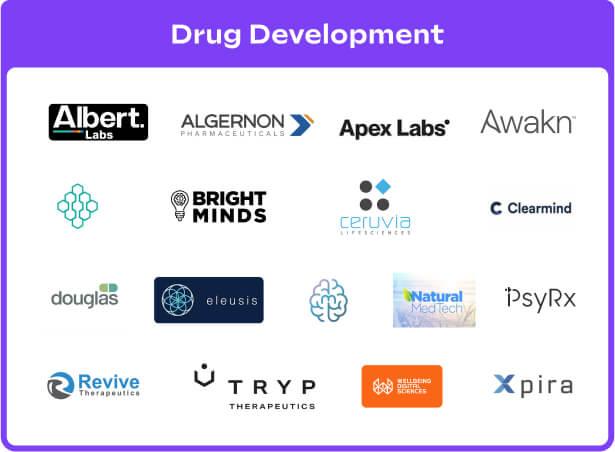
Media & Marketing
Public perception of psychedelics remains mixed despite the scientific evidence supporting their medicinal benefit. To overcome the stigma around psychedelics, media and marketing companies create advertising campaigns to influence public opinion.
These campaigns help to educate the general public on the potential benefits of psychedelics while promoting products and services offered by psychedelic companies. Marketing companies connect interested buyers with vendors who carry psychedelic goods. The large variety of psychedelic products means that in-depth marketing is necessary to reach relevant audiences.
Outside of advertising campaigns, individuals share their experiences with the public through media in the form of blog posts, podcasts, and written testimonials.
- PSYC Corporation (https://www.psyccorporation.com/)
- Alan Aldous (https://alanaldous.com/)
- Better Plant Sciences (https://betterplantsciences.com/)
- Goodness Growth Holdings (https://goodnessgrowth.com/)
- Integration Communications (https://integrationcommunications.com/)
- Pharmacology and Therapeutics (https://www.sciencedirect.com/journal/pharmacology-and-therapeutics)
- OEV Partners (https://www.oevpartners.com/)
- Pharmadrug Super Smart (https://pharmadrug.ca/super-smart/)
- DoubleBlind (https://doubleblindmag.com/)
- Psychedelic Traveler (https://thepsychedelictraveler.wordpress.com/)
- The Oak Tree Review (https://oaktreereview.com/)
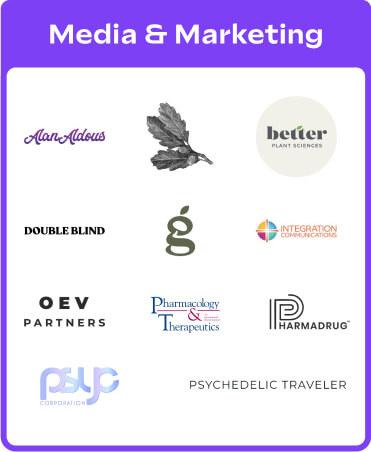
Research Institutes
Research institutes are expanding into the field of psychedelic medicine by conducting studies about the effectiveness of various psychedelic treatments. Many colleges and universities form departments dedicated to the study of psychedelic compounds. These departments employ students and faculty to conduct and publish academic research.
These research institutes create a more reliable body of knowledge about psychedelics by conducting research professionally and impartially. Furthermore, high levels of interest in the field of psychedelics make it easier to secure funding for more studies to be undertaken by research institutes.
- Emory University Center for Psychedelics and Spirituality (https://psychedelics.emory.edu/index.html)
- Leiden University Medical Center (https://www.universiteitleiden.nl/en)
- John Hopkins Center for Psychedelic & Consciousness Research (https://hopkinspsychedelic.org/)
- Ohio State University Center for Psychedelic Drug Research & Education (https://www.cpdre.org/)
- University of Ottawa Psychedelics & Spirituality Studies Initiative (https://www2.uottawa.ca/en)
- University of Health Sciences Antigua (https://www.uhsa.ag/)
- Maastricht University Psychopharmacology Program (https://psychopharmacologymaastricht.com/)
- University of Toronto Psychedelic Studies Research Program (https://www.utm.utoronto.ca/psychedelics/)
- Monash University Clinical Psychedelic Research Lab (https://www.monash.edu/medicine/scs/research/clinical-psychedelic-research)
- Medical University of South Carolina Psychedelic Research Center (https://medicine.musc.edu/departments/psychiatry/research/ongoing)
- University of Wisconsin-Madison Transdisciplinary Center for Research in Psychoactive Substances (https://pharmacy.wisc.edu/centers/tcrps/)
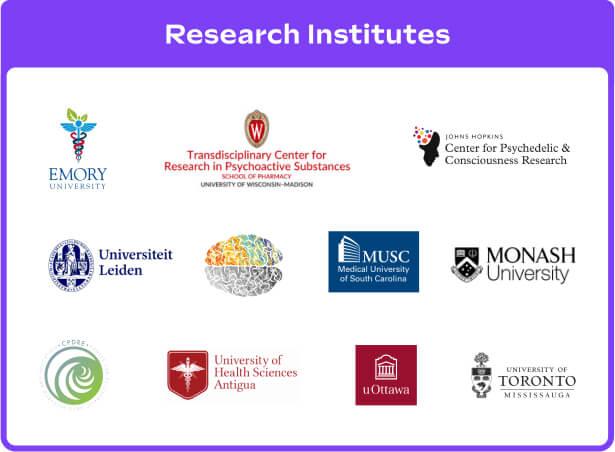
Private Research
Private/independent research companies perform a similar function to research institutes but are privately funded. This distinction is important because private organizations have a greater range of freedom in the topics they are able to research.
Private research groups can explore niche topics that may not attract enough interest to be covered by a large research institution. Furthermore, research institutions may have limited budgets and limits to the scope of the research they can perform.
Private research groups can obtain funding from various sources, allowing them to conduct more specific research without constraint.
- Syreon Research Institute (https://syreon.eu/)
- Ethica CRO Inc (https://ethicacro.com/)
- EntheogeniX (https://www.entheogenixbio.com/)
- Tactogen Inc (https://tactogen.com/)
- GH Research (https://www.ghres.com/)
- KRTL Biotech (https://www.krtlbiotech.com/)
- Alkemist Labs (https://www.alkemist.com/)
- Allen Institute (https://alleninstitute.org/)
- HealthTech Connex (https://healthtechconnex.com/)
- Transpharmation (https://www.transpharmation.com/)
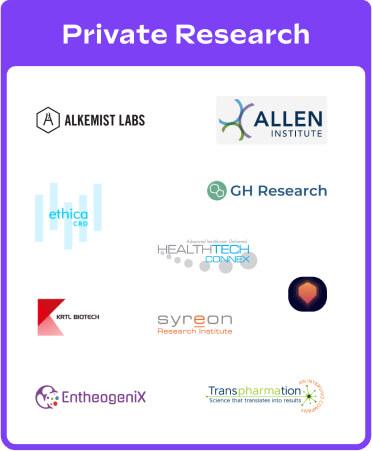
Marketplaces
Companies build marketplaces to facilitate the legal sale of psychedelic compounds from producers to consumers. Some companies produce and sell their own products, while others create online spaces for users to shop for various products from different companies.
Online marketplaces are usually based outside of the US and only ship to locations where the use of psychedelics is legalized. These marketplaces offer a range of psychedelic goods, including mushrooms, tinctures, and extracts.
As more states legalize psychedelics in the U.S., more online marketplaces will form to connect consumers with products. In other words, the e-commerce marketplace industry scales alongside psychedelic legalization.
- Three Amigos Psilocybin (https://3amigos.co/)
- Medicinal Mushroom Dispensary (https://mushroomdispensary.com/)
- MindLift (https://mindlift.me/)
- Red Light Holland (https://redlight.co/)
- Doseology (https://doseology.com/)
- Blue Goba (https://www.bluegoba.com/)
- Canada Mushrooms (https://www.canadamushrooms.ca/)
- Pure Extracts Corp (https://pureextractscorp.com/)
- Multiverse (https://yourmultiverse.com/)
- Psillow (https://psillow.com/)
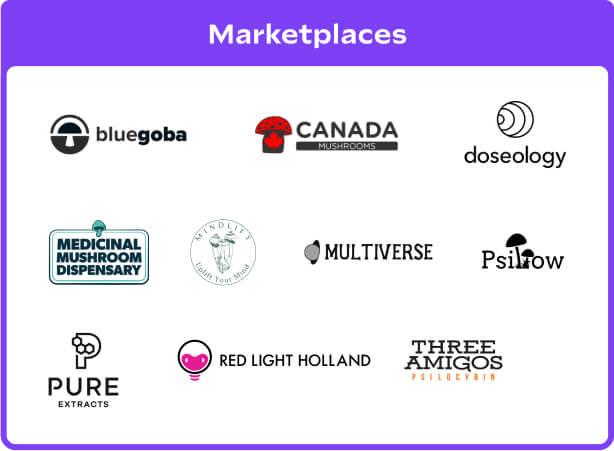
Legal & Regulatory
Psychedelics are heavily regulated in the US and internationally. In recent years, more states have legalized psychedelics in some form, but many legal restrictions still remain. New law firms have been founded to help companies navigate the complex legal framework surrounding psychedelics and ensure compliance with laws.
Although laws outside of the US are generally less strict concerning psychedelics, international law firms help companies retain necessary licenses and permit them to operate in the psychedelics field.
As more states move towards full and partial legalization of psychedelics, legal firms are necessary to advise and guide new businesses in meeting regulation.
- Psychedelic Bar Association (https://thepsychedelicbar.org/)
- Beckley Foundation (https://www.beckleyfoundation.org/)
- Psychedelic Society Belgium (https://psychedelicsocietybelgium.org/)
- Oregon Psilocybin Advisory Board (https://www.oregon.gov/oha/PH/PREVENTIONWELLNESS/Pages/Psilocybin-Advisory-Board-Meetings.aspx)
- Psilonautica (https://psilonautica.com/)
- Calyx Law (https://www.calyxlaw.com/)
- Aird & Berlis LLP (https://www.airdberlis.com/)
- Vicente Sederberg (https://vicentesederberg.com/)
- Barnes Caplan LLP (https://www.barnescaplan.com/)
- Clark Howell (https://clarkhowell.com/)
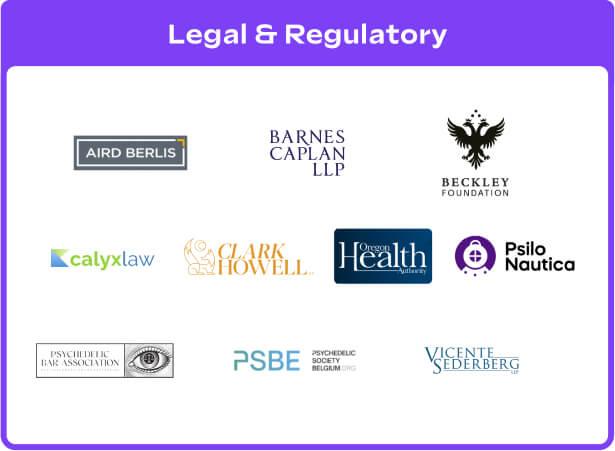
Biotech
Biotech companies seek to combine cutting-edge technology with medicinal research to advance and improve treatments. Many biotech companies focus on developing technology to enhance the effectiveness of psychedelic treatments.
For example, biotech company Mindseye uses AI technology to analyze patient profiles and suggest the most efficient psychedelic treatments to address their conditions. Biotech companies aim to combine advanced technology with psychedelic treatments in a holistic approach to patient care.
- Freedom Biosciences (https://www.freedombio.co/)
- IMIO Life (https://www.imio.life/)
- Clairvoyant Therapeutics (https://www.clairvoyantrx.com/)
- Enveric Biosciences (https://www.enveric.com/)
- Wesana Health (https://wesanahealth.com/)
- PharmAla Biotech (https://pharmala.ca/)
- Aikido Pharma Inc (https://aikidopharma.com/about/)
- MINDCURE Health (https://www.mindcure.com/)
- Pacific Neuroscience Institute (https://www.pacificneuroscienceinstitute.org/)
- Cyclica (https://cyclicarx.com/)
- Mindseye (https://mindseye.co/)
- Molecule (https://www.molecule.to/)
- Halugen (https://www.halugen.com/)
- Wonder Sciences (https://www.wondersciences.com/)
- April 19 (https://www.april19.ai/)
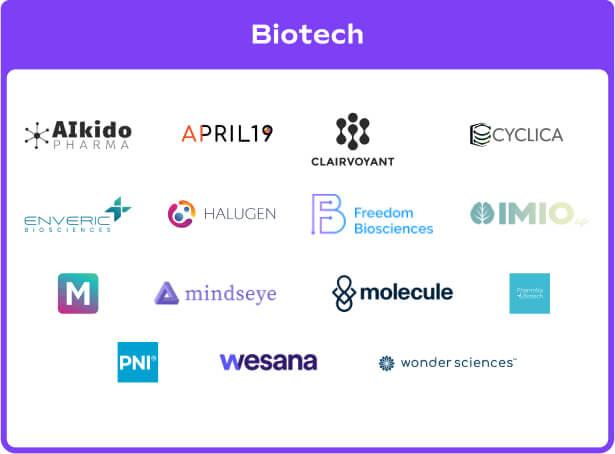
News & Reporting
The psychedelic field is highly dynamic, and new information is constantly released. Clinical studies, institutional research, and new laws relating to psychedelics come out with high frequency. News companies catalog this information and present it to audiences in a logical manner.
Without psychedelic news companies, the public may miss groundbreaking data in the psychedelics field. Stories about psychedelics are featured in mainstream news media like the New York Times, but news outlets that primarily feature psychedelic content are gaining traction as the popularity of psychedelics rises.
- Lucid News (https://www.lucid.news/)
- Report on Psychedelics (https://reportonpsychedelics.com/)
- Psychedelic Times (https://psychedelictimes.com/)
- Psychedelic News Wire (https://www.psychedelicnewswire.com/)
- Psychedelic Spotlight (https://psychedelicspotlight.com/)
- Microdose Psychedelic Insights (https://microdose.buzz/)
- Psychedelic Science Review (https://psychedelicreview.com/)
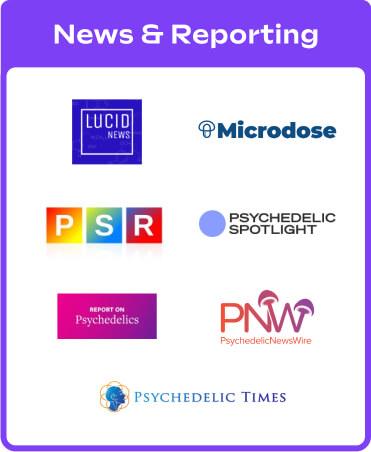
Cultivation
Cultivation is the process of growing plants and fungi that are used in psychedelic medicines. The cultivation process is necessary to obtain the natural components that will eventually be used to extract the chemical compounds used in drugs.
Cultivation companies must adhere to health and safety guidelines to ensure their products meet industry standards. These companies supply research centers and drug development companies and may also provide directly to consumers in some cases.
A notable subcategory of cultivation companies is companies that produce synthetic psychoactive compounds. Rather than extract these compounds from natural sources, some companies produce the chemicals in a laboratory setting.
- Psyence Production (https://psyence.com/psyence-group/psyence-production/)
- Optimi Health Corp (https://www.optimihealth.ca/)
- Myco Systemics (https://mycosystemics.com/)
- Panacea Plant Sciences (https://panaceaplantsciences.net/)
- Anahit International (https://anahitic.ca/)
- Back of the Yards Algae Sciences (https://www.algaesciences.com/)
- Vocan Biotechnologies (https://vocanbiotech.com/)
- Psyched Wellness (https://psyched-wellness.com/)
- Havn Life (https://havnlife.com/)
- Octarine Bio (https://octarinebio.com/)
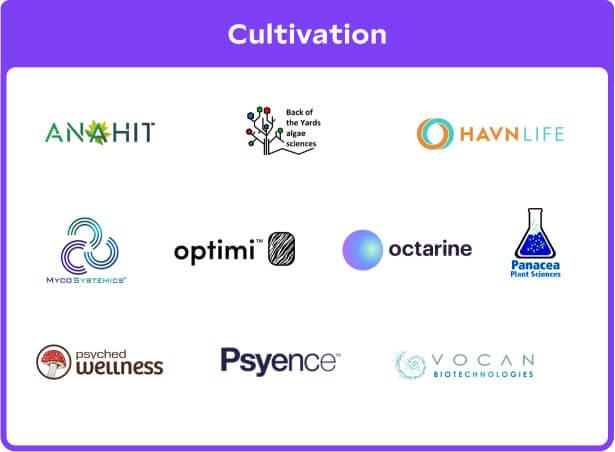
Therapy
Psychedelic medication alone may not always be effective enough to treat an illness. Many companies integrate psychedelics into a comprehensive therapy plan to better cater to patients’ needs.
The combination of psychedelics and therapy is a new and exciting method clinics are using to treat mental health disorders like PTSD, depression, and anxiety. Companies use a holistic approach to psychedelics and therapy to create a better, more effective treatment plan for patients.
Psychedelic therapy sessions are often offered at licensed clinics and performed by a team of medical professionals.
- AIMS Institute (https://www.aimsinstitute.net/)
- An Enduring Love (https://www.enduringlovetherapy.com/)
- Mycotopia Therapy (https://www.mycotopiatherapies.com/)
- Heroic Hearts Project (https://www.heroicheartsproject.org/)
- Mindspace Wellbeing (https://www.mindspacewellbeing.com/)
- Foundations Recovery Network (https://www.foundationsrecoverynetwork.com/)
- California Center for Psychedelic Therapy (https://psychedelictherapyca.com/)
- Insight Psychiatry (https://www.insightpsychiatry.org/)
- OmTerra (https://www.omterra.org/)
- Ovid Health Systems (https://ovid-clinics.com/)
- Psirenity (https://www.psirenity.com/)
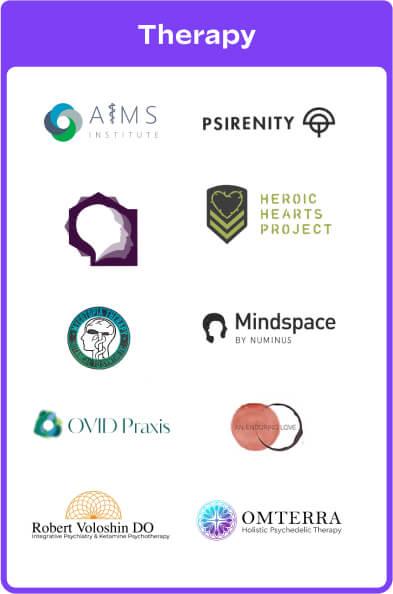
Investment Groups
The growth of the psychedelics field is an appealing opportunity for venture capitalists to invest in promising startups. Investment groups research early-stage psychedelic companies and invest in companies they find favorable. If these companies are successful in their enterprise, investment groups can potentially profit from their investment.
Investment groups are essential to the startup ecosystem because they provide early-stage funding to fledgling companies. Without speculation from outside investors, many psychedelic companies would lack the financial means to achieve the company goal.
These are some of the investment groups taking an active position in backing psychedelic products and medicine:
- Apeiron (https://apeiron-investments.com/)
- Empath Ventures (https://www.empath.vc/)
- JLS Fund (https://www.jls.fund/)
- Oscillate (https://oscillateplc.com/)
- Ambria Capital (https://www.ambriacap.com/)
- Leafy Tunnel (https://www.leafytunnel.com/)
- Tabula Rasa (https://www.tabularasa.ventures/)
- Clarify Pharma PLC (https://www.clarifypharma.com/)
- Orthogonal Thinker (https://orthogonalthinker.com/)
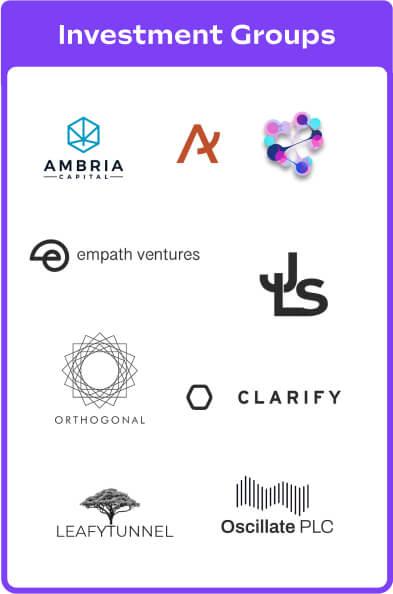
Education
The psychedelic medicine industry is a developing field with complex medical and clinical subject matter. Psychedelic education groups seek to spread information about the positive mental and physical health benefits of various psychedelic treatments. Part of this effort is to dispel common misconceptions about psychedelics and their role outside recreational use.
To educate the public about psychedelics, educational groups create free content to disseminate through media channels. This content can be in the form of written blogs, testimonials, educational videos, or research papers.
Another important function of educational groups is to train clinical technicians to administer psychedelic treatments. These groups provide education and training to medical professionals entering the psychedelics field.
- Delic Corp (https://deliccorp.com/)
- The International Center for Ethnobotanical Education, Research, and Service (ICEERS) (https://www.iceers.org/)
- Alef Trust (https://www.aleftrust.org/)
- Osmond Foundation (https://www.osmond-foundation.org/)
- Psychedelic Medicine Association (https://psychedelicmedicineassociation.org/)
- Third Wave (https://thethirdwave.co/)
- Multidisciplinary Association for Psychedelic Studies (MAPS) (https://maps.org/)
- Drug Science (https://www.drugscience.org.uk/)
- Entheogenesis Australis (https://www.entheogenesis.org/)
- Healing Advocacy Fund (https://healingadvocacyfund.org/)
- Intercollegiate Psychedelics Network (https://intercollegiatepsychedelics.net/)
- Solent Psychedelic Community (https://www.solentpsy.co.uk/)
- People Science (https://peoplescience.health/)
- Fluence (https://www.fluencetraining.com/)
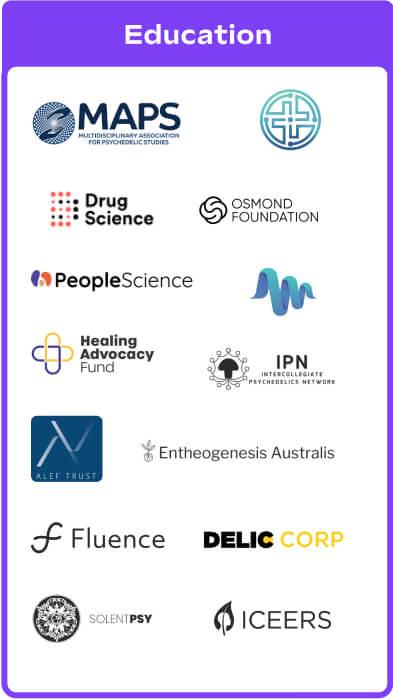
Retreats
Psychedelic retreats are vacation-style getaways that center around undergoing psychedelic experiences. The goal of psychedelic retreats is to provide clients with a safe environment to experience psychedelics. These retreats often feature psychedelic sessions facilitated by industry experts to ensure a positive experience.
Many psychedelic retreats are located in international countries where the use of psychedelics is permitted by law. Customers in the U.S. require significant travel to attend psychedelic retreats. This may soon change with the acceptance of psychedelics within U.S. laws, allowing such retreats to be housed in the country.
These are some of the companies that currently host retreats outside the U.S.:
- Synthesis (https://www.synthesisretreat.com/)
- Essence Institute (https://www.essence.nl/)
- Beckley Retreats (https://www.beckleyretreats.com/#retreats)
- Awaken Your Soul (https://awakenyoursoul.co/)
- New Moon Psychedelic Retreats (https://www.psychedelicretreat.org/)
- A Whole New High (https://www.awholenewhigh.com/)
- Rythmia (https://rythmia.com/)
- Soltara Healing Center (https://soltara.co/)
- Atman Retreat (https://atmanretreat.com/)
- Behold Retreats (https://www.behold-retreats.com/)
- Hive (https://hive.bio/)
- Within Center (https://within.center/)
- Apotheosis Retreat (https://apotheosisretreat.com/)
